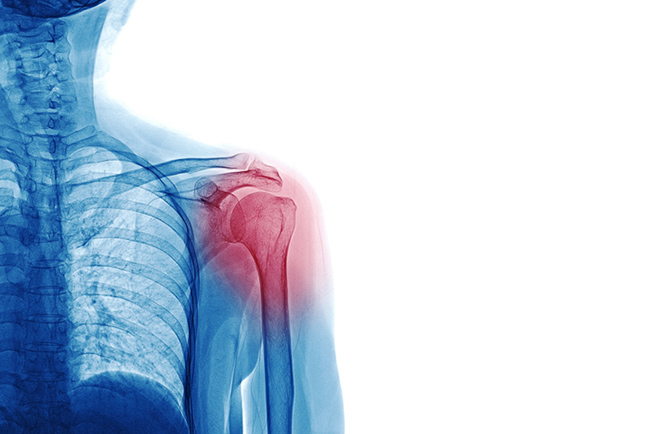
Your shoulders are the most movable joints in your body. They can also be unstable because the ball of the upper arm is larger than the shoulder socket that holds it. To remain in a stable or normal position, the shoulder must be anchored by muscles, tendons, and ligaments.
(source)
Shoulder Pain
 One of the most important joints in the body is the shoulder. With a healthy shoulder you are able to reach, pull, push – perhaps carry the weight of the world on your shoulders and sometimes offer a shoulder to cry on. But when you suffer from a shoulder injury, it can become very painful and debilitating. It can not only hinder your ability to perform daily activities, but may be a sign that you have a deeper injury.
One of the most important joints in the body is the shoulder. With a healthy shoulder you are able to reach, pull, push – perhaps carry the weight of the world on your shoulders and sometimes offer a shoulder to cry on. But when you suffer from a shoulder injury, it can become very painful and debilitating. It can not only hinder your ability to perform daily activities, but may be a sign that you have a deeper injury.
It is important to contact a physical therapist who is a musculoskeletal expert to evaluate your shoulder and create a treatment plan for your specific condition. Getting the right treatment as quickly as possible can prevent a worsening of your shoulder condition and avoid the necessity for surgery. Call us today to set up an appointment with one of our physical therapists.
Rotator Cuff
The shoulder allows movement in virtually every direction and is composed of three bones: the clavicle, the humerus and the scapula. The wide range of motion in the shoulder is due to the rotator cuff. It comprises the four muscles (the supraspinatus muscle, the infraspinatus muscle, the teres minor muscle and the subscapularis muscle) that protect the shoulder. Injury to your rotator cuff is often a result of excessive throwing, lifting or reaching. A rotator cuff injury can be due to tendinitis, bursitis or tears. According to the American Academy of Orthopaedic Surgeons, the symptoms of a rotator cuff injury include:
- Pain at rest and at night, particularly if lying on the affected shoulder.
- Pain when lifting and lowering your arm or with specific movements.
- Weakness when lifting or rotating your arm.
- Crepitus or crackling sensation when moving your shoulder in certain positions.
Shoulder Dislocation
 Shoulder Dislocation occurs when the ball of the arm and the shoulder socket separate. This is usually caused by a traumatic accident, sports injury or fall. There may be discoloration, numbness or a cold feeling in the arm or hand. This can also be painful and can make moving your arm difficult. Physical therapy can help reduce the inflammation, increase strength, improve range of motion and reduce pain. Typically the recovery process can take four to eight weeks.
Shoulder Dislocation occurs when the ball of the arm and the shoulder socket separate. This is usually caused by a traumatic accident, sports injury or fall. There may be discoloration, numbness or a cold feeling in the arm or hand. This can also be painful and can make moving your arm difficult. Physical therapy can help reduce the inflammation, increase strength, improve range of motion and reduce pain. Typically the recovery process can take four to eight weeks.
Frozen Shoulder
This condition includes pain and stiffness in your shoulder. According to the Mayo Clinic, “the bones, ligaments and tendons that make up your shoulder joint are encased in a capsule of connective tissue. Frozen shoulder occurs when this capsule thickens and tightens around the shoulder joint, restricting its movement. Doctors aren’t sure why this happens to some people, although it’s more likely to occur in people who have diabetes or those who recently had to immobilize their shoulder for a long period, such as after surgery or an arm fracture.” Another name for frozen shoulder is adhesive capsulitis. Left untreated, a frozen shoulder may resolve itself in one to three years. If you need full use of your shoulder sooner, then the treatment options would include arthroscopic surgery and/or physical therapy. Physical therapy may be your best option for treating a frozen shoulder.
Physical Therapy and Shoulder Pain
Many people can recover from various types of shoulder conditions without surgery. Physical therapy can play a key role in your recovery without having to use these invasive methods. If you have had an injury or have pain in your shoulder, a physical therapist from Progressive Physical Therapy can evaluate your range of motion and functional abilities. Our goals would include reducing pain and inflammation, improving flexibility, decreasing muscle spasms and speeding up the recovery process. Treatment methods would include strengthening and stretching exercises, hot or cold therapy, manual therapy, electrical muscle stimulation, dry needling and laser therapy.
Have you suffered a shoulder injury? Do you have shoulder pain and don’t know why? The therapists at Progressive Physical Therapy have the expertise and experience to help with a variety of shoulder conditions. Call us toll-free at (877) 342-2669 to schedule a one-on-one appointment with a physical therapist so that we can help you on your road to recovery.


